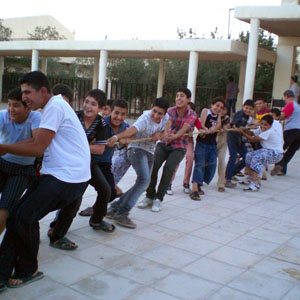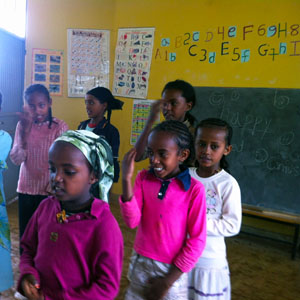IEDP Students On Unique International Summer Internships
Augsut 19, 2013 - Students in Penn GSE’s International Educational Development Program (IEDP) are participating in unique internships across the globe this summer, thanks to the recent appointment of IEDP Director Dan Wagner as the UNESCO Chair in Learning and Literacy.
According to Wagner, the Learning and Literacy Chair is the first of its kind at a US school of education and is focused on achieving UN Millennium Development Goals for basic education and literacy. But Penn students are benefitting as well; Wagner has used this opportunity to expand the thriving International Internship Program (IIP), now a key experience for students in the IEDP program.
IEDP Associate Director Ameena Ghaffar-Kucher says Penn GSE's international education program is one of few in the country that requires an internship. "The para-professional internship experience provides students with the opportunity to apply the theories and skills they have learned through coursework," she says. "It also allows students to continue to grow and learn from the communities and organizations they engage with during the internship."
This summer, students are serving as interns in 17 cities across 14 countries, ranging from Senegal to Jordan to Nicaragua. Ten students are interning with UNESCO, while others are working with UNICEF, World Vision, Aga Khan Foundation, and other agencies. Below, we asked IEDP students Laura McAdams, Beza Wossene, and Joshua Cleveland a few questions about their summer internships.

Laura McAdams
Internship: UNESCO
Location: Amman, Jordan
Hometown: Portland, Oregon
What are you working on this summer?
I am working on writing an implementation evaluation of the Non-formal, Informal, and Mentoring programs that UNESCO is managing through its implementing partner Questscope.
UNESCO Amman received a 4.3 million Euro grant for an emergency education response to Syrian refugees in Jordan. In Jordan, kids who have dropped out and have not been enrolled in the formal education system for two or more years cannot legally re-enroll. The Non-formal Education (NFE) program provides these kids with an alternative pathway to earn an official 10th grade equivalency certificate after participating in three cycles (eight months each) of non-formal education instruction. The informal education (IFE) program focuses more on teaching life skills and addressing psycho-social issues of children who have either dropped out or have never attended formal schooling. Finally, the mentoring program trains Syrian refugees in the Za'atari refugee camp to act as case managers and mentors to young mentees, providing support and organizing community service, recreational, and creative activities.
To research this program, I have been going on site visits to observe NFE, IFE and mentoring sessions, and to speak with the session's facilitators and students. I've attended a training session for the Ministry of Education liaisons for the NFE program, spent a lot of time with the staff from Questscope, and of course, am conducting a desk review of a lot of material pertaining to NFE/IFE/mentoring in Jordan and in conflict zones/post-conflict zones in general. I have also been filling in around the office where needed: I've helped to organize a conference on Inclusive Education for students with disabilities in Jordan, was on a team to write a concept note on multipurpose community centers for social cohesion in urban areas with high levels of tension between Jordanians and Syrians, and am now helping to write a concept note on teacher training for more effective reading education in the early grades.
What are you learning from your experience?
I have learned so much during my internship! I've been learning about educational programming in emergency situations, how to write a good concept note, and how to “play nice” in an office with people from all over the world. I've also been learning a lot about Jordan while living here, of course: politically, historically, culturally, linguistically. Outside of work, I've been volunteering with the Scientific Culture Society of Jordan, writing and helping to teach hands-on science lessons for kids in after school programs.
 Beza Wossene
Beza Wossene
Internship: World Vision
Location: Addis Ababa, Ethiopia
Hometown: Addis Ababa, Ethiopia and York, Pennsylvania, USA
What are you working on this summer?
I am working on monitoring World Vision's Literacy Boost program for primary-aged children in and out of school. I am also documenting information from two pilot sites and writing the implementation approach to the Literacy Boost scale-up for other districts in the Oromo region.
How or why did you choose to intern with World Vision?
I loved World Vision’s community-based programs and their willingness to evaluate each project and try something new. I also wanted to travel to the region where they work.
What are you learning from your experience?
I have learned so much just in these two months. Organizations could not work without partnering with major stakeholders like the Ministry of Education and other NGO's. With every program, the organization has to have buy-in from the country, the community, and the people, and more work needs to be done to keep track of institutional memory as staff come and go. In terms of field work, I've learned that there is nothing more rewarding than working on the ground along with the people you serve. I have grown a lot since my young days in Ethiopia, and so has the country. The hardest lesson was to stay neutral in religious and political conversations.

Joshua Cleveland
Internship: Aga Khan Foundation
Location: Mombasa, Kenya
Hometown: Broadview Heights, Ohio
What are you working on this summer?
During my time at the Aga Khan Foundation, I have been working on an impact evaluation study of one of the Foundation’s programs, Reading for Children. The program has installed mini-libraries in villages throughout southern Kenya and has provided training and support to encourage parents in those villages to borrow books and spend time reading with their children. After speaking with staff members and making several exploratory trips to program sites, I devised a research plan and a set of research tools designed to help me assess whether the program is accomplishing its objectives, and am in the midst of collecting data.
The research is very field-based: I visit two villages every week and spend a day collecting data at each one. It is also very people-oriented: I get to speak with village librarians, parents, students, and teachers in each community. These interviews have exposed me to a stunning variety of landscapes, communities, and personalities. Some parents murmur their responses to my questions; others bark them. Some children laugh when I sit on their intricately woven mats to read alongside them; others scoot away nervously. Sometimes I find myself sitting in a circle among 10 or more parents, some of whom finished high school; at other times, I am sitting next to a grandmother who isn’t quite sure whether we’re looking at the front or the back of the storybook. In every case, the data collection days are eventful, long, exhausting, and wonderful—precisely the kinds of experiences I had hoped to have during my time here.
What are you learning from your experience?
Since arriving in Kenya, I’ve been throwing myself headlong into learning the Swahili language as quickly as possible, and have come to a point where I am able to conduct some of the interviews, especially those with the students, in Swahili.
So far, the biggest lesson I have drawn from this experience has been learning to accept imperfections or irregularities in the research process that are brought about by the messiness of real life. The complex, variegated situations I have encountered on the ground have simply refused to conform to rigid research protocols or purely scientific designs. Even as I attempt, therefore, to do everything I can to ensure the integrity of the study, I have learned the importance of being flexible and pragmatic in the face of unforeseen turns in the road.
Overall, I feel that this experience has stretched me, both personally and professionally, and has given me the opportunity to develop research and language skills that I hope to be able to use in this field in the near future.
